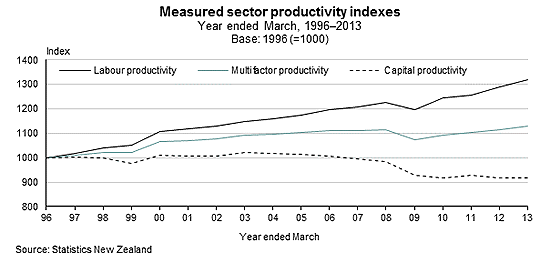
Content supplied by Statistics NZ
Labour productivity increased 2.1% in the March 2013 year, Statistics New Zealand said today.
This is higher than the average annual rate of 1.6% for the 17-year period since 1996, when the series began.
“The 2.1% increase in labour productivity was driven by both an increase of 1.2% in multifactor productivity and a 0.9% growth in the amount of capital available per worker,” national accounts manager Michele Lloyd said.
Labour productivity measures the quantity of goods and services (output) produced for each hour of labour. The latest figures show that 100 products could have been produced in one hour of labour in 1996, compared with 132 in one hour of labour in 2013.
In the March 2013 year, multifactor productivity, which measures how efficiently goods and services are produced in the economy, grew 1.2%. This was because outputs (goods and services) grew faster than the inputs (hours of labour, and capital, like land and buildings) used to produce them. Growth in this area shows more efficient production and is often associated with technological change, organisational change, or economies of scale.
From 1996 to 2013, labour productivity grew more in Australia than in New Zealand, up by an average of 2.1% and 1.6% per year, respectively. Over the same period, Australia’s annual average output growth was also higher, at 3.5% compared with 2.6% in New Zealand.
Productivity is regarded as key to increasing New Zealand’s standard of living and is a major driver of gross domestic product – the main indicator of economic activity.
Productivity statistics cover approximately 80% of the economy and exclude government administration and defence, health, and education.

We welcome your comments below. If you are not already registered, please register to comment
Remember we welcome robust, respectful and insightful debate. We don't welcome abusive or defamatory comments and will de-register those repeatedly making such comments. Our current comment policy is here.